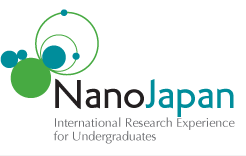

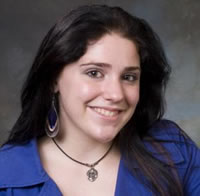
Alumni Update
Leora Cooper is named first author on an Applied Physics Letters article that resulted from her NanoJapan 2009 research project.
L. Cooper, H. Amano, M. Hiraide, S. Houkyou, I. Y. Jang, Y. J. Kim, H. Muramatsu, J. H. Kim, T. Hayashi, Y. A. Kim, M. Endo, M. S. Dresselhaus, "Freestanding, Bendable, thin film for supercapacitors using DNA-dispersed double walled carbon nanotubes," Applied Physics Letters 95, 1 (2009).
[Abstract]
Why NanoJapan?
I first heard about the NanoJapan program through a student-wide email, sent out by the engineering department at my school. At the time, I was looking for a summer internship that would combine my love for chemistry and engineering with my desire to immerse myself in other cultures. When I saw the NanoJapan program, it was obvious to me that this program was exactly what I was looking for.
As a freshman, I have been searching for ways to explore my fields of interest in a practical manner like research, instead of just learning the theory in my classes and textbooks. I feel that the NanoJapan program is important to physics and engineering student nationwide because it provides participants with an opportunity to explore their interests in their fields in a practical and international manner. It is clear to me that the future of science lies in international collaboration, and the NanoJapan program provides us with a chance to be part of this. My research position this summer will help me to understand potential areas of interest of which I might not even be aware. In addition, I know that whatever I end up doing, the skills that I will learn in Endo-Sensei’s lab will assist me in all of my future endevors, as the field of nanotechnology is so omnipresent in chemical engineering today.
NanoJapan also gives me an opportunity to reconnect with Japan and Japanese culture. As a young child, my father spent a lot of time going back and forth between our home in the Sillicon Valley and Japan. The rest of my family went with him several times, however, we have not been back for a long time. I view the NanoJapan program as an opportunity to finally learn to speak Japanese, and to learn and understand Japanese culture. I hope to gain knowledge and understanding of how international labs are run, and to make connections I will use for the rest of my life. This summer, I am looking forward to getting the chance to apply my knowledge of chemistry, physics and engineering to practical lab work, as well as the opportunity to explore Japan!
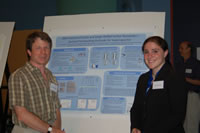
Laura Cooper Presents at the 2009 RQI Summer Research Colloquium
Laura Cooper gave a poster presentation on Characterization of Double-Walled Carbon Nanotubes at the 2009 RQI Summer Research Colloquium. To view her abstract and poster click here.
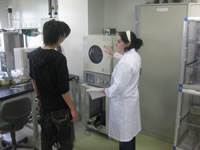
Research Project Overview
My research project at Shinshu University in Nagano was a little different from some of the other research projects, in order to be a little more pertinant to my major. I used a mixture of single stranded DNA and single and double walled carbon nanotubes (separated) in various proportions in order to create films for their use in a supercapacitor. I really enjoyed the experience of working in a lab, because it always seemed like there was something exciting being done. I enjoyed the freedom of the work, in that, if something clearly wasn’t working, we could have a meeting, discuss it, and, if necessary, completely change what we were doing!
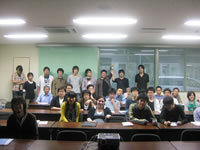
My lab at Shinshu Daigaku was a very group oriented lab. I did my entire experiment with my three mentors, as well as any specific specialists who helped us with certain machines. I found the group experience very rewarding, as I always had a group of people who were happy to try to help me, and were always eager to chat during extended wait times. Every day, the entire lab went to the cafeteria for lunch together, and we all ate and conversed at the table. Every single thing that we did was done as a group. I really enjoyed this type of environment, because it meant that I always had people to talk to if I got bored, and there was always another person to help if one of them didn’t know the answer to my question. However, if you know that you don’t do well in a group environment, or if the idea of being immersed in Japanese language and culture intimidates you, you might find this lab frustrating. My lab also had a lot of socializing outside of the lab, and everyone was always very happy to go places with me. Of course, all of the outside-the-lab trips were also done in groups of at least five other people.
I also really enjoyed the international aspect of the lab. If the machine I was working on required a lot of wait time, I could then work on my Japanese. We would turn a corner, and someone would say or do something completely foreign to me, and the adventure would continue. Because we were from such different cultures and societies, the educational systems were different, so there were things that they pointed out that I would never have thought to look at, and vice versa. I found it very rewarding. I have continued to stay in touch with my lab, and I know that I will use the connections that I made this summer in future research endeavors. This summer has shown me that I would really like to continue on to get either a master’s degree or a PhD after graduating.
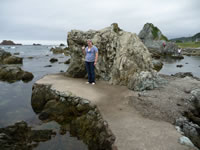
Daily Life in Nagano
My daily life in Japan was fairly simple. Every morning, I arrived at the lab shortly after waking up. I had Japanese classes in the mornings three days each week with a private tutor. During my time at the lab, my three mentors and I would do all the experiments together. There was a lot of wait-time involved with most of machines we used, which gave me a lot of time to chat with my mentors and other labmates, as well as time to practice my Japanese. At lunch time, everyone in the lab would go to the cafeteria together, where we would all sit around one long table and discuss life outside the lab over a surprisingly good cafeteria meal. Everyone ate together, and when we were all finished eating, we would go to the student store together to purchase snack foods. These lunches were a great way for me to get to know some of the students that were not directly involved with my research project.
In the evenings, I would walk back to my apartment from the lab. I generally got back and went straight back out to take a bike ride around the city. Because Nagano is a very spread-out city with very few tourist attractions, I used these evening bike rides to explore the city. I would usually either purchase a simple dinner while out, or I would buy the ingredients I needed to cook when I got back. I ate a lot of onigiri, tofu and udon, but I also enjoyed trying something strange at every meal. I spent almost all of my weekends traveling around Japan. Courtesy of my three week Japan Rail (JR) pass, a group of us NanoJapan students were able to travel to Kyushu and Hokkaido!
During my stay in Japan, I visited 17 prefectures thanks to my JR passes. Staying in Nagano, which doesn’t have a lot of foreigners around, the biggest challenges I faced were trying to make myself understood by the people around me, and trying to understand the people around me. However, towards the end, I began to be able to have conversations in Japanese, which was one of the most rewarding things I was able to do.
My Favorite Experience in Japan was...
Going to Sado Island with 11 of my friends from the lab. It was a side of Japan I would never have otherwise gotten to see, and I enjoyed every minute of it!
Before I left for Japan I wish I had...
Realized that Japanese people don’t wear shorts. I couldn’t find pants that fit me, so my mom had to send me a package with jeans in it!
While I was in Japan I wish I had...
Spent more time with the people from my lab. I traveled a lot around the country, and I’m very glad I did (especially since I made some amazing friends!), but this summer was really the only chance I had to spend with all of those friends together.
Tips for Future NanoJapan Participants